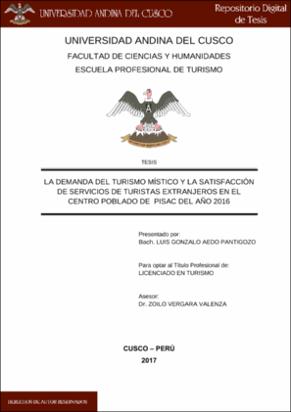| dc.contributor.advisor | Vergara Valenza, Zoilo Ladislao | |
| dc.contributor.author | Aedo Pantigozo, Luis Gonzalo | |
| dc.date.accessioned | 2018-06-04T14:45:29Z | |
| dc.date.available | 2018-06-04T14:45:29Z | |
| dc.date.issued | 2017-06-09 | |
| dc.identifier.uri | https://hdl.handle.net/20.500.12557/1676 | |
| dc.description.abstract | En los últimos años en el centro Poblado de Pisac se puede observar la creación de diferentes instalaciones que ofrecen y proveen los servicios de turismo místico a los turistas, pudiendo mencionar, restaurantes de comida vegetariana y vegana, centros de talleres de yoga, Tai chi, o incluso hoteles y albergues, siendo los servicios que realizan desde ofrendas a la tierra, lectura de coca hasta ceremonias de plantas psicotrópicas como el cactus San Pedro o el Ayahuasca. El objetivo de la investigación es conocer el nivel de satisfacción de los turistas de esta creciente demanda de turismo místico, la metodología aplicada es descriptiva de tipo cualitativa no experimental.
En el Capítulo I se describe el planteamiento del problema, se determinan los problemas y objetivos, se justifica la investigación, delimita el problema, limitaciones de la investigación y aspectos éticos. En el Capítulo II se abordan los antecedentes de la investigación, las bases teóricas, el marco conceptual, las hipótesis y sistema de variables. El Capítulo III expone la metodología de la investigación. El Capítulo IV presenta los resultados de la investigación con su respectivo análisis e interpretación. El Capítulo V está compuesto por la discusión y las propuestas de la investigación. Por último se detallan las conclusiones, recomendaciones, bibliografía y anexos que complementan el desarrollo de la investigación. | es_PE |
| dc.description.abstract | In the last years we can observe the creation of different facilities and installations that offer and provide mystical tourism services to tourists, including vegetarian and vegan restaurants, yoga workshops, Tai chi, or even hotels and hostels. We can find many of these services since offerings to the Earth, reading of coca leafs, until ceremonies of psychotropic plants like the cactus San Pedro or the Ayahuasca. The research wants to show the level of satisfaction of tourists from this growing demand for mystical tourism. Chapter I describes the approach to the problem, determines the problems and objectives, justifies research, and delimits the problem, limitations of research and ethical aspects. Chapter II deals with the background of the research, the theoretical bases, the conceptual framework, the hypotheses and the system of variables. Chapter III sets out the research and methodology. Chapter IV presents the results of the research with its respective analysis and interpretation. Chapter V is composed of discussion and research proposals. Finally, the conclusions, recommendations, bibliography and annexes that complement the development of the research. | en_US |
| dc.description.uri | Tesis | es_PE |
| dc.format | application/pdf | es_PE |
| dc.language.iso | spa | es_PE |
| dc.publisher | Universidad Andina del Cusco | es_PE |
| dc.rights | info:eu-repo/semantics/restrictedAccess | es_PE |
| dc.source | Universidad Andina del Cusco | es_PE |
| dc.source | Repositorio Institucional - UAC | es_PE |
| dc.subject | Turismo místico | es_PE |
| dc.subject | Demanda--Turismo | es_PE |
| dc.subject | Satisfacción-Cliente | es_PE |
| dc.subject | Capacitaciones | es_PE |
| dc.title | La demanda del turismo místico y la satisfacción de servicios de turistas extranjeros en el centro poblado de Pisac del año 2016. | es_PE |
| dc.type | info:eu-repo/semantics/bachelorThesis | es_PE |
| thesis.degree.name | Licenciado en Turismo | es_PE |
| thesis.degree.grantor | Universidad Andina del Cusco. Facultad de Ciencias y Humanidades | es_PE |
| thesis.degree.level | Titulo Profesional | es_PE |
| thesis.degree.discipline | Turismo | es_PE |

